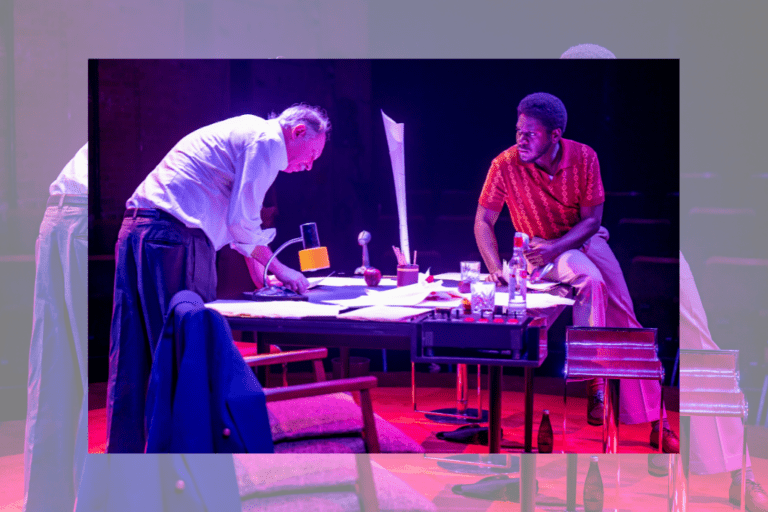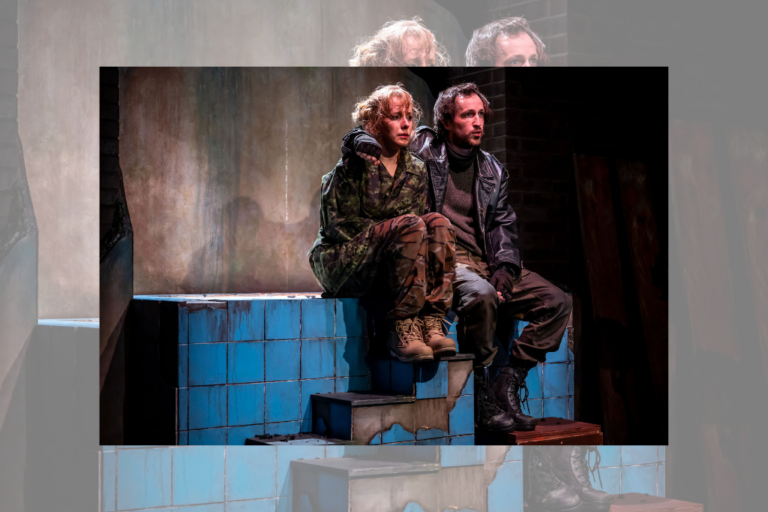‘What the hell do I do with all these puppets?’: Inside the wonderful world of Ronnie Burkett
When I asked Ronnie Burkett if he considered himself a “queer icon,” the 67-year-old master puppeteer let out a boisterous laugh.
“Look at me,” remarked the incredulous Burkett while adjusting his loose-fitting beige cardigan. “I don’t think icons look like this.”
Self-deprecating jests aside, few would deny that Burkett’s unapologetically campy Theatre of Marionettes has helped elevate the art of puppetry to new heights. His works tend to live far beyond the outskirts of Sesame Street, exploring dark topics from the Holocaust to the AIDS epidemic and exhibiting a creative sensibility that’s equal parts meditative, macabre, and mirthful.
“It’s hard for one to stay buoyant in that,” opined Burkett, noting how “there’s almost too many dismal subjects to choose from, in a weird way. So I think I’m focusing more on something that maybe the audience is feeling too: How do you stay upright and forward moving with all of this swirling around us all the time?”
Wonderful Joe, arriving in Toronto following performances in Alberta and California, examines an aging gentleman and his trusty canine companion as they go on one last adventure after being evicted from their apartment. The stage will be populated by an eclectic cast of Burkett’s gorgeously handcrafted marionettes, all expertly operated and voiced by the man himself. With a plot that calls to mind Pixar’s Up and Anand Rajaram’s recent Fringe darling Crosstown, Wonderful Joe promises to be heartfelt — and at least a little bit saucy.
Though much of the show’s impetus derived from Burkett’s concerns about gentrification, as well as his cherished bond with his own dog, its earliest sparks of inspiration came when he began to notice a few of his collaborators’ charming quirks.

“My production manager Terri Gillis and I, we always refer to a cup of coffee as a cup of joe,” recounted Burkett. “And I remember her one day saying, ‘That’s a wonderful cup of joe,’ and I thought, Wonderful Joe, I love the sound of that. And my lighting designer, Kevin Humphrey, he says ‘wonderful’ all the time. You’ll say, ‘How’s this?’ and he’ll go, ‘Oh, that’s wonderful.’ It got into my mind, a character who sees everything as wonderful, regardless of how bleak it is.”
After re-emerging from his pandemic hiatus with a series of improvisational spoofs that repurposed characters from his Daisy Theatre showcases, Burkett says he was ready to dive back into something with more of a textual foundation. As mainstream puppetry continues to grow in scale, Burkett is maintaining his commitment to keeping his work small and intimate. “I don’t think I’ve even touched the surface of what solo work can be,” he asserted with modest satisfaction. “I want to keep shrinking the world, and examining it, and say to the audience, ‘what do you think?’”
I encourage people to make shit up. Have this steaming cauldron of bullshit that you ladle into the work, but also another cauldron of yourself, and you could put a few ladles of your own backstory in there.
Given the pronounced auteurist vision that drives his solo performances, there’s little surprise that audiences have speculated about autobiographical undercurrents, seeking to follow the literal threads that connect Burkett’s characters to their creator. Though not at all hostile toward these interpretations, Burkett cautions against too heavily indulging in assumptions. He often finds that the parts of his shows assumed to be autobiographical are actually those he invented whole cloth.
When teaching puppet creation and playwriting at the Eugene O’Neill Theater Center in Waterford, Connecticut, Burkett forbids students from doing explicitly autobiographical pieces. In his mind, making a show that’s entirely about yourself is a surefire way of squandering puppetry’s rich potential, “because a puppet lets you be everything but yourself.”
“I encourage people to make shit up,” he continued. “Have this steaming cauldron of bullshit that you ladle into the work, but also another cauldron of yourself, and you could put a few ladles of your own backstory in there.”
Even if some aspects of Wonderful Joe’s fable about a compassionate soul and his dog may come from the personal backstory cauldron, Burkett assured me that the narrative’s emphasis on “one last adventure” is hardly an act of self-portraiture.
“More than a few people said to me, ‘so this is your last show’,” he shared. “Trust me, I had never said this is my last show. I think that’s maybe a bit of ageism, or wishful thinking.”

Opening in Toronto on the coattails of him receiving this year’s Governor General’s Lifetime Achievement Award, Burkett confessed that the show and the accolade are both tinged with “an ominous note of finality.”
Yet, even after a lifetime of achievements, there will always be more stories to tell. Burkett shared that he’s already begun brainstorming his next show, under the delightful working title Sissy Geppetto Saves the World. He also continues to play an active role in rearing the next generation, frequently welcoming aspiring puppeteers into his studio to peruse his “1,600 books on puppetry” and take on work placements that he called “the best kind of old-school method of mentoring that I can offer.”
When asked if he ever thought about his legacy, his knee-jerk answer was, “Not really. I think about, what the fuck do I do with all of these puppets?”
After a pause for reflection, practicalities subsided, and some loftier thoughts began to emerge. “There’s an audience of people who love some of my characters,” he acknowledged, “and love them separate from me. That’s phenomenal to me, that people can embrace something that’s obviously not real, and make it real. That’s why the audience is important. They make it real.”
He went on, “I think if you’re lucky, you get to contribute one small little thing to an ongoing form. I don’t know…. Maybe that’s why I don’t want to stop. If I stop, I’ll sit around and worry about my legacy.”
Wonderful Joe runs at the St. Lawrence Centre for the Arts from October 5-23. Tickets are available here.















I saw Tinka’s new dress in Colaiste Muire Parnell Square in the mid 90’s. It ranks as one of the greatest evenings I ever had. Ronnie Burkett it was said, was not too happy with the venue, and worked in great jokes about the Gate theatre nearby. It got the prize of the audience’s favourite production.
Please come back to Dublin soon.
Wonderful Joe is playing in Vancouver. Of all the puppets in the show, Ronny loves Joe Pickle the best.